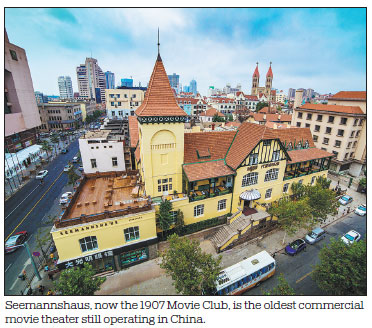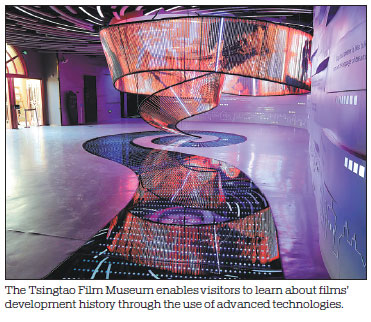Cinematic background an integral part of city's soul
By Zhang Dandan | (China Daily )| Updated : 2019-02-25
Print PrintQingdao, a city in East China's Shandong province, is more expressive than others as it has an important history of film and pushes to get more people watching them.
Benefiting from a unique natural environment, flourishing economy and relaxed culture, Qingdao has a background in film that dates back more than 100 years. The city achieved several firsts in Chinese cinema.
In 1900, Hotel Prinz Heinrich - the city's first large and luxury hotel founded the previous year - became the first place in China to show a movie.
Later, Seemannshaus, a building to house the German navy in Qingdao in 1899, was China's first commercial cinema. They advertised in newspapers in 1907.
The naval club, in typical German architecture with neorenaissance style, was built to provide a resting place for soldiers and sailors to prevent them from wandering the streets, excessive drinking or crime.
The German naval club released hundreds of the most popular silent films. The black and white motion pictures opened the door to Qingdao's film culture.
The building, also made a national cultural heritage site in 2006, was identified as the most ancient commercial film screening venue in China by the China Film Association and China National Film Museum in June 2016.
Before, the Hongkew Cinema in Shanghai - run commercially in 1908 - was regarded as China's first cinema. It has since been demolished.
Nowadays, Qingdao has developed its film culture by various means, allowing movies to keep charming audiences in the city.
The Tsingtao Film Museum opened in 2017, aiming to forge a film industrial exchange and cooperation channel. It aims to connect the city with the world, according to the city government.
Developed and established by Qingdao West Coast Development Group, the film museum uses virtual reality and three-dimensional projection to tell the history of world, Chinese and Qingdao film.
Qingdao itself is an open museum. Film leaves a tangible and intangible impression on almost every corner of the city and penetrates into its soul and the lives of its citizens, according to the local government.
The city has more than 60 cinemas, entertaining more than 13 million people every year.
In addition, Qingdao regularly screens movies for free in urban squares, rural communities, schools and welfare houses. More than 70,000 film screenings are held every year.
Qingdao has a number of educational institutions engaged in film and television performances, including Qingdao No 39 Middle School, Beijing Film Academy Modern Creative Media College and Qingdao School of Arts of Shanghai Theatre Academy.
The city has hosted the China Film Society of Performing Art Awards. They are also known as the Golden Phoenix Awards.
It is held every two years and caught the world's attention for its authority and professionalism, according to the local government.
In view of the city's achievements in the film industry, the United Nations Educational, Scientific and Cultural Organization named Qingdao a Creative City of Film in 2017, which has been granted to Bradford in the UK and Sydney, Australia. Qingdao is the first Chinese city to win the title.
zhangdandan@chinadaily.com.cn


